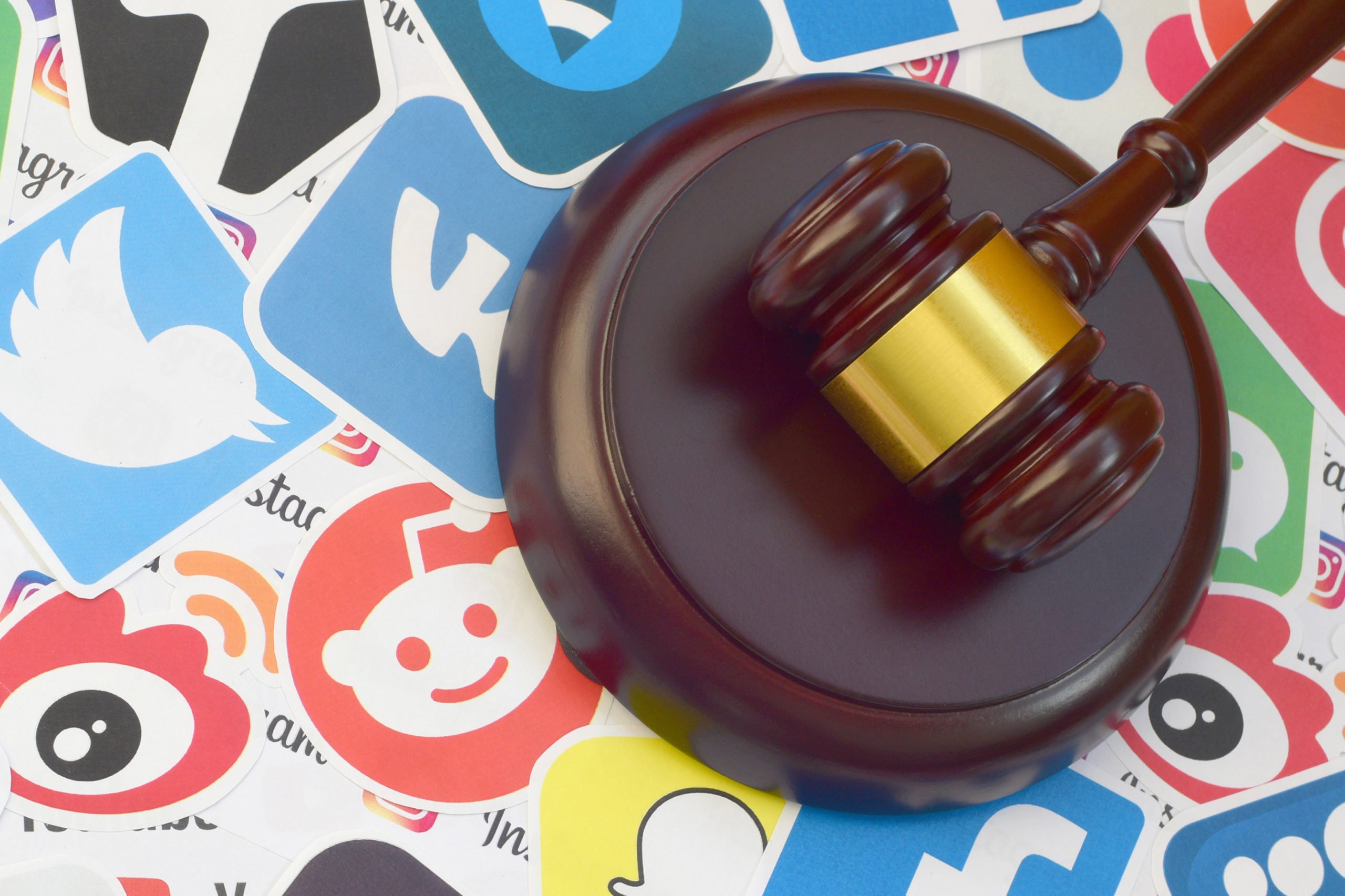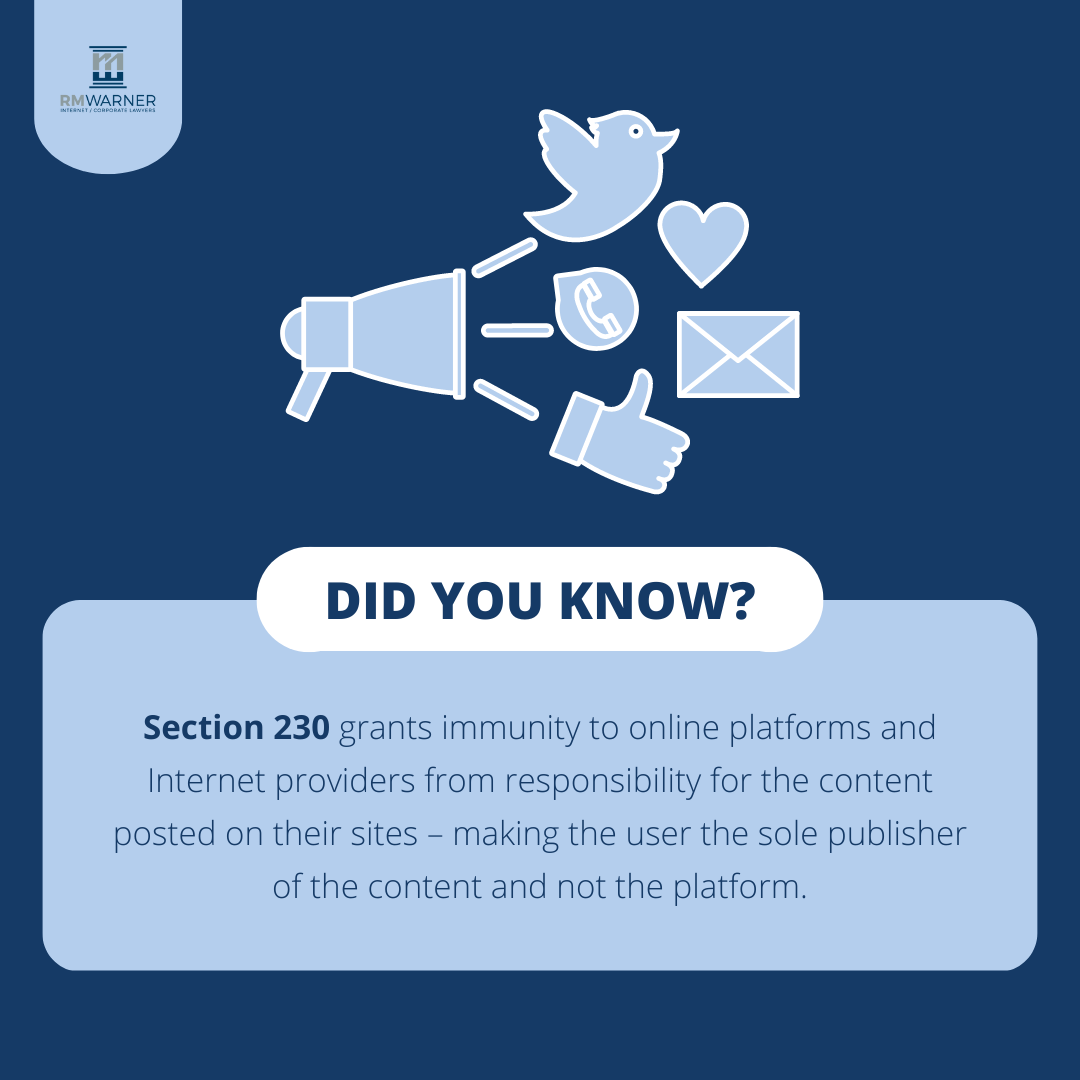The Controversy Surrounding Section 230 of the Communications Decency Act
The Controversy Surrounding Section 230 of the Communications Decency Act

What’s Section 230?
It’s obvious that tech companies like Facebook and Twitter have been a huge topic of conversation in politics and in court. Many believe that social media companies need to be held accountable for the content users post and be barred from discriminating against political viewpoints. However, when taking a closer look at the purpose of Section 230 Communications Decency Act, changing the law- or eliminating it altogether as some have suggested- may not be the solution.Section 230: Immunity for Social Media Platforms
Section 230 of The Communications Decency Act reads, “No provider or user of an interactive computer service shall be treated as the publisher or speaker of any information provided by another information content provider” (47 U.S.C.§ 230). This grants Facebook and other tech companies immunity from the content published on their platforms because they are not publishers. Someone cannot sue Yelp for hosting a defamatory review on their platform because Section 230 gives immunity for social media platforms, leaving the responsibility to the user who posted the review. The relevant exception here is the online platform engages in editorial acts and thereby becomes a content contributor (versus a content aggregator or host).Section 230 Pros and Cons
As the 2020 election approached, politicians were concerned that social media platforms lack neutrality and discriminate against certain political viewpoints. On July 11th, 2019, the White House hosted a social media summit that focused on bias against conservatives, according to The New York Times. Suggested solutions to alleviate this political bias was to treat tech platforms as the publishers so they can be held responsible for suppressing conservative content. The problem is, Section 230 does not force people or platforms to be politically neutral. It simply separates Internet platforms from Internet users, describing the users as the publishers of their own speech. Section 230’s primary purpose is to cultivate and encourage moderation. In fact, eliminating this law would promote more censorship because if tech giants were held responsible for user generated content, it would motivate them to remove problematic content that they do not want to be held liable for. Republican Senator Josh Hawley of Missouri proposed a bill that would remove the immunity Section 230 provides for big tech companies and require them to submit bianuall audits to the FTC that would prove their content-removal process and algorithms are politically-neutral. [SEE: Does Big Tech Need To Be Held Accountable? New Legislation Is Being Introduced That Could Make Companies Like Facebook, Google And Twitter Liable For Users’ Content] On the other hand, Eric Goldman, a professor at Santa Clara University Law School, doesn’t think Hawley’s bill would promote political neutrality, but instead promote “false equivalencies” according to his blog post. Goldman touches on how not all political parties are equally legitimate, going on to say that promoting equality among all political parties would deem the American Nazi Party as equally legitimate as the Republican party. It probably wouldn’t be the worst idea to discuss changing C.D.A. 230 because of the fact that it was created in 1996 and the Internet has changed dramatically since then. Facebook and Twitter were not even introduced until almost ten years later. In 1996, the Internet was just beginning to grow and now, it has flourished into an entirely new way to communicate, create, entertain, advertise and trade goods and services. If you think back to when the radio was first introduced into society, the Federal Communications Commission enforced the Fairness Doctrine on the airwaves. This required broadcasters to air balanced opinions on political and controversial issues. However, the reason this was necessary was because with radio, there is a limited amount of air space for radio stations to exist. When it comes to the Internet on the other hand, there is an endless sea of possibilities. What do you think? Should there be Section 230 exceptions? Should it be changed or removed due to the growth of the Internet? Or should Section 230 of the C.D.A remain the way it has always been? Social Media Companies Beware! Change May be Coming Soon to Section 230
Social Media Companies Beware! Change May be Coming Soon to Section 230
Following in the steps of Mesa Public Schools, Scottsdale Unified School District is considering suing Meta, parent company of Facebook and Instagram, as well as other social media platforms, such as Snapchat and Twitter, for public nuisance in an attempt to persuade social media companies to fix their algorithm so children aren’t targeted.
This is in response to growing worries regarding student mental health that both parents and school officials have voiced. According to ABC15, Mesa Public Schools board member Kiana Sears stated, “As a public school district, we definitely want to ensure our children’s well-being and mental state of mind is improving every day,” during a board meeting in January.
However, Katey McPherson, a certified mental health professional and digital wellness advocate, talked to ABC15 and issued a warning to any district taking a stand against social media. She cautioned putting a blanket blame on these platforms as it will do no good for anyone.
When asked about the likelihood of success in this internet lawsuit, RM Warner Law co-founder and internet attorney Raees Mohamed had this to say: “Social media companies do not have a legal duty to protect overuse of its platform or to modify their algorithms to make them less attractive to students. Suing them for public nuisance is likely to fail for a variety of reasons. For example, where are the parents in all of this? Parents are the ones who have a legal duty to protect their children from harm, including harm that may be caused by social media overuse. It will be interesting to see if these social media companies call the parents of the alleged injured students from these school districts. Also, let’s not forget about Section 230 of the Communications Decency Act which grants immunity to platforms, protecting them against liability resulting from user generated content. The addictive nature of these platforms results from user content, not simply the algorithms. If the content was terrible, the algorithms would serve no purpose. A similar case was filed in Seattle earlier this year, but the case was transferred to the Northern District of California earlier this month. We will be watching for updates.
Looking for an Internet Lawyer?
If you are being defamed, cyberbullied, or harassed on social media or the Internet in general, contact the Internet attorneys at RM Warner Law. We can guide you through the path to justice. Get in touch today.Similar like this
You also might be interested in
The Comprehensive Guide to Handling Defamation in the Era of Social Media
The power of social media is undeniable. It connects us [...]
Advanced E-commerce Legal Strategies: Navigating New Challenges in 2024
The e-commerce industry is witnessing remarkable growth and transformation in [...]
Overcoming Online Defamation: RM Warner’s Legal Advice
The internet offers endless opportunities for growth and connection. However, [...]
E-commerce Intellectual Property: Legal Protection with RM Warner
Protecting your intellectual property (IP) in the e-commerce space can [...]






